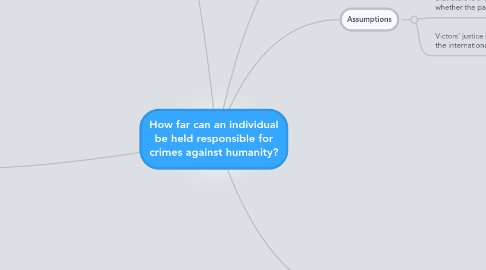
1. Definitions
1.1. Crimes against humanity
1.1.1. can be defined as the extreme and sustained degradation and humiliation of one or more indivuals; as part of a wider and systematic practice condoned by a higher authority, whether de facto or de jure
1.1.1.1. Genocide. E.g Khmer Rouge regime killing in Cambodia
1.1.1.2. hitler
1.1.1.3. Torture
1.1.1.4. Enslavement
1.2. Responsible
1.2.1. Being accountable for, or to blame for something
2. An indivudual cannot be wholly responsible for such a widespread and sustained practice of atrocities
2.1. Actions of many are due to being subjected to oppression or under orders of someone of higher authority
2.1.1. Child Soldiers in conflicts, especially in African conflicts
2.1.1.1. International criminal court recognises that only persons aged above 18 can be held fully accountable for their actions and no one has been brought before the court to be charged for crimes against humanity committed before they turned 18.
2.1.1.2. Often forcibly inducted into army or involuntarily recruited with the enticement of food and relative safety in conflicts
2.1.1.3. Used by adult commanders to commit the most heinous crimes because they are exempt from prosecution, hence unfair to prosecute them when they effectively have no choice in the matter.
2.1.1.3.1. Hence, the International Criminal Court (ICC) pursues the leaders and not the actual child soldiers
2.2. A person can only create the philosophy , but the actual actions have to be carried out by an allied group
2.2.1. Pol Pot and his Khmer Rouge Regime which led to the 'Killing Fields', killing around 21% of the Cambodian population at the time
2.2.2. Hitler and his 'final solution' which encouraged the holocaust, eventually taking the lives of over 6 million Jews
2.2.3. Certainly, without the leaders who were the driving force in both examples, the two genocides would likely not have occurred. Nevertheless, the actual actions had to be supported and carried out by supporters of the regimes.
2.2.3.1. The amount of paperwork, transportation of the condemned, and the act of actually killing them required a great amount of co-ordination and manpower, hence a complicit understanding of the deeds were undertaken by those within the agencies responsible for carrying out the crimes
2.3. The culture of the perpetrators may have ingrained in them the hatred behind the crimes, and as such the crimes are committed by one or more communities against a select group and not by an individual
2.3.1. Rwanda Genocide
2.3.1.1. Ferdinand Nahimana, and Jean Bosco Barayagwiza, persons in charge for the Radio Télévision Libre des Mille Collines, as well as Hassan Ngeze, director and editor of the Kangur newspaper charged by International Criminal Tribunal for Rwanda for spreading hateful and discriminatory messages through the media which encouraged the 1994 Genocide and all were jailed for at least 30 years
2.3.1.2. Supported by Rwandan Government
2.3.1.3. Hutu majority already resented Tutsi minority because the Tutsis had repressed the Hutus up till a revolt in 1962
2.3.1.4. Years before the genocide, there is already a distinction between Tutsi and Hutu people. However, Belgia colonized Rwanda and recognized this distinction formally. They gave the minority Tutsi community power of rule over the Hutu majority
2.3.2. Guilty by not acting upon the knowledge
2.3.2.1. States or individuals that do not disprove of the crimes are guilty because they did not try to prevent evil from being committed
2.3.2.1.1. China and the USA continued to support to the Khmer Rouge throughout the genocide. The USA in particular funneled $85 million in funds to the regime from 1980-1986 and pressured the UN to send $12 million worth of food to the Khmer Rouge in 1980.
3. Assumptions
3.1. that there is a free and fair court to determine whether the parties are responsible
3.1.1. the international legal definition of crimes against humanity is determined by the guidelines set by the Geneva Convention
3.1.1.1. Assuming that their definition is correct and free of bias
3.2. Victors' justice is not prevalent in the international court
4. An individual should be fully responsible for his/her own actions
4.1. The actions may be condoned by society and the authorities, but are often not forced upon the perpetrator
4.1.1. Apartheid in South Africa
4.1.1.1. While it is not possible to demand the same amount of bravery as Suzman had from everyone, one can certainly choose not to participate in the actions, especially the systematic rape and lynching of the blacks without major repercussions, hence the actual act of committing the crime can be said to be undertaken consciously by the individual, holding him fully responsible for the action
4.1.1.2. Helen Suzman,was an anti-apartheid activist serving in the South African Parliament during the apartheid era, and courageously crusaded for the end of the repression of the blacks in South Africa.
4.1.2. Counter argument
4.1.2.1. However, the mindset is often authorized and encouraged by the authorities, hence the perpetrators are often taught to hate the group discriminated against
4.1.2.1.1. Blacks were given limited education opportunities because of the Bantu Education Act and were mainly prepared for menial labour, forming the foundation for the impression of black inferiority
4.2. Command responsibility
4.2.1. Accepted by the International Criminal Court as a crime against humanity by hierarchical accountability of his subordinates
4.2.1.1. ICC issued an arrest warrant for Sudanese President Omar al-Bashi in 2008 because he masterminded the plan of exterminating tribes in Darfur based on their ethnicity and sponsored war crimes there
4.2.1.2. Counter Argument
4.2.1.2.1. We need to question whether it is one's responsibility to intervene in matters one merely has knowledge in. If that is the case, people should be condemned guilty by association
